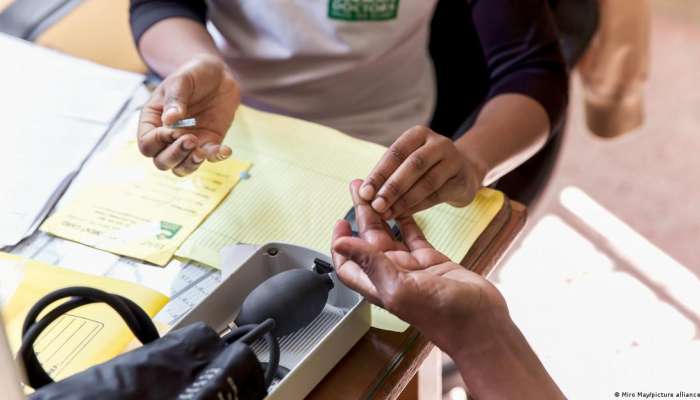
Children born with Type 1 diabetes in sub-Saharan Africa die in childhood, said Biyi Adesina, a diabetologist in Nigeria. That was certainly true until very recently.
Now, increased awareness of the condition throughout the region has allowed many children with Type 1 diabetes, who depend on daily insulin injections, to live past their first and second birthdays.
But Adesina told DW that a diagnosis was just half the battle.
In Nigeria's private health care system, the majority of the population is uninsured. Drugs for noncommunicable diseases — such as insulin — are frequently an out-of-pocket expense for patients or their parents.
Parents can't pay children's diabetes treatment
A month's dose of insulin costs 15,000 Nigerian naira — half the monthly minimum wage salary of 30,000 Nigerian naira ($20, €18). Depending on a person's condition, they may need up to three doses per month.
Parents of children with Type 1 diabetes find themselves at a loss for what to do, said Adesina. They have other children, and themselves, to feed.
"Sometimes the parents will prefer that [their children] die," he said. "We listen to young people who say, 'My parents would prefer that I die so I won't continue to be a burden.' They just cannot afford insulin."
This is a common story of diabetes, both types 1 and 2, in sub-Saharan Africa.
Although doctors know how to diagnose and treat the noncommunicable disease, there is no existing infrastructure to ensure patients receive the prohibitively expensive care they need.
Data show preventable deaths of people with diabetes in sub-Saharan Africa
The number of diabetes cases in sub-Saharan Africa has increased tenfold since 2000, a development largely attributed to globalization and industrialization in the region.
Unlike 20 years ago, people are now driving cars, working in sedentary jobs and consuming more junk food, which is cheap and ubiquitous in countries like Nigeria, Adesina said.
Diabetes killed more than 416,100 people in sub-Saharan Africa in 2021, according to data from the International Diabetes Federation.
During the same year in the African region, World Health Organization data showed that about 410,000 people died of HIV/AIDs-related diseases, about 365,000 of tuberculosis and another 580,000 died of malaria.
In a 2019 article published by The Lancet medical journal, health experts projected that noncommunicable diseases, including diabetes, and particularly Type 2 diabetes, would overtake "communicable, maternal, neonatal and nutritional diseases combined" as the leading cause of death in sub-Saharan Africa by 2023.
These statistics and projections only offer a glimpse into the breadth of the problem. Diabetes is severely underdiagnosed in sub-Saharan Africa — doctors estimate that some 50% of cases go undocumented.
In Nigeria, hospitals seen as a 'last resort'
Adesina knows the problem well. He told DW that he chose to specialize in diabetes medicine because of his family's own history with the disease.
When he was a child, he said, his grandfather had a gaping sore on his leg which — "for years and years" — refused to heal. He remembers looking at that lesion, at the age of 10, wondering what it could be.
He now knows why his grandfather's leg never healed. He had diabetes foot, one of the telltale signs of diabetes in sub-Saharan Africa.
It's common, he said, for Nigerians to attribute wounds or foot ulcers, such as the one his grandfather had, to what he called a spiritual attack. "The hospital is always the last resort," said Adesina.
"That is the traditional belief," he said. "Oh, it was a spiritual attack against you that made you have an ulcer on your leg that is not healing […] So instead of going to a hospital, people begin to look for alternatives to counter the spiritual attack."
Only when all home remedies have failed will patients seek care in a hospital, said Adesina. But by then, the infection is often so bad that amputation is the only option.
Diabetes foot represents the top cause of amputations in sub-Saharan Africa.
Private health care too expensive for many people
Experts maintain, however, that many people simply cannot afford the necessary health care.
While most sub-Saharan Africans can get HIV drugs, malaria antiretroviral therapy and tuberculosis shots for free, they are required to pay out of pocket for care related to noncommunicable diagnoses like diabetes or hypertension.
This can result in people putting off treatment until it's too late, or simply never seeking it, said Felicia Anumah, a professor of medicine/endocrinology and diabetology at the University of Abuja in Nigeria.
And even when they do receive a proper diagnosis, patients often can't afford the drugs needed to get better. Individuals with Type 2 diabetes often have other health problems and require a number of different medications to stay stable, Anumah told DW.
A poor patient with diabetes, hypertension and dyslipidemia, for example, could require up to six drugs to stay healthy, she said, but may only realistically be able to afford two.
"The patient will likely choose the two that he or she can afford," Anumah said, adding that when those drugs run out, the patient may not have enough money to immediately refill their prescription.
"Blood sugar is going up and down, blood pressure is going up and down," she said. Over an extended bout of such inconsistent treatment, "What do you expect?"
"Complications and premature death," she said, answering her own question. "Can you imagine?"
DW